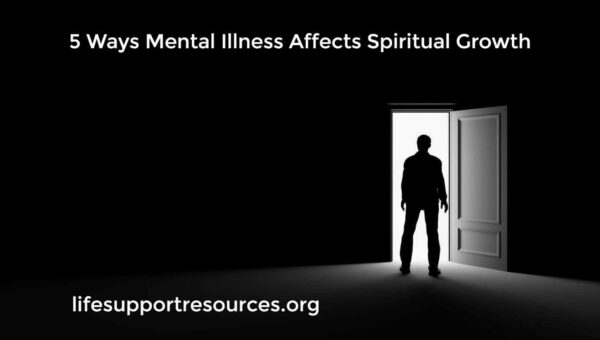If you work in ministry you’ve seen the spiritual growth of individuals stall out from time to time. Someone can be engaged on a strong growth track when suddenly they lose interest. More often the spiritual drift is gradual and it can be easy to miss the indicators that someone in your community has become disengaged or lost their thirst to grow. Most leaders will take the initiative to explore the cause of spiritual drift. Mental illness can be a major barrier to spiritual growth and can be difficult to spot. Here are a few of the stumbling blocks created by mental illness.
Self-Perception
Mental illness can have a profound effect on someone’s view of themselves. Even people who have a relatively healthy mental condition can have trouble seeing themselves as adored children of God. That perception is much more difficult for those who feel they are defective or unworthy. These are people who actually believe that they are not good enough for God. They desperately need words of encouragement (from people they know and trust) about God’s view of them. Share appropriate scripture but bring God’s word to life by adding in examples of times when you have felt inadequate and unworthy of God’s love if you can.
God Perception
Mental illness can feel like a curse from God. Those who struggle can develop a flawed view of how God is working in their life and world. They can see God as an angry and vengeful power who is punishing or disciplining them for something (real or imagined) about themselves. Those in this mindset can focus on the parts of scripture that highlight this part of God’s character. Share reminders of the ways God has shown understanding, patience, and love for individual people. One good strategy is to help them find a character in the bible with whom they can relate, then illuminate the ways that person was loved by God.
Apathy
People who are afflicted with a mental illness often feel as if they have lost control of their reality. It can feel like it doesn’t matter what they do, they will never find release or change. Someone who feels trapped and hopeless may find it hard to understand the benefit of any kind of spiritual practice as they don’t see a way forward. It’s important for these people to hear authentic, relatable stories of hope and transformation. Shared experience groups are excellent strategies to help them see God at work in and through them.
Isolation
Mental illness creates separation. Many people who are struggling with their mental health (even in small ways) tend to separate themselves from others. Feelings of inadequacy and assumptions about the way others are judging them, make it easier for the sufferer to simply avoid interactions that they see as uncomfortable. This avoidance creates a snowball effect. As the person disengages, their mental illness begins to take up a bigger space in their life so the person detaches even further. It is important to look for the early signs of isolation and take steps to interrupt the process of detachment. Have your staff and ministry leaders make note of who is missing from services or activities, or who is attending less often. Invite these people to be involved and connect them with others who will include them in activities, groups, or study. Be sure that you or your staff is engaging personally with these people.
Addiction
Mental health struggles and addiction are often partners in suffering. Sometimes, addiction creates or ignites dormant mental illnesses. Other times addiction grows out of mental illness as the sufferer seeks relief through destructive substances or behaviors. Addiction can overwhelm a person to the point where each of the previous points (perception of self and God, apathy, and isolation) are all present. Spiritual growth can also suffer as the addict experiences diminished cognitive abilities and other physical harms. Believers sometimes cause harm to addicts by addressing the addiction simply as a sin issue. This over-simplification of a complex problem can drive people away from their community of believers, the church, and God. A lot of spiritual damage is done in the church by people who see those struggling with addiction as unworthy to be present in church with the rest of the church community. Ministry leaders would be wise to go out of their way to visibly welcome those who are suffering. In addition to sharing appropriate bible lessons that reinforce the way God sees and values the addict, ministry leaders and friends can provide prayer and important emotional support. Referral to an addiction profession or program, as well as shared experience groups are excellent ways for church leaders to respond to this mental health need.

